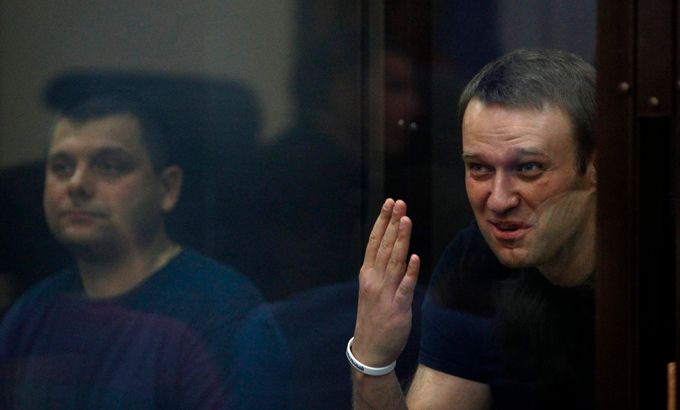Freed Kremlin critic arrives in Moscow
Protest leader Alexei Navalny arrives to cheering crowd of supporters and vows to push forward with Moscow mayoral bid.

Alexei Navalny, the Russian opposition leader, has returned to Moscow to a warm welcome from supporters after his unexpected release from a provincial jail pending his appeal against a five-year sentence on embezzlement charges.
Navalny and his wife Yulia on Saturday stepped off an overnight train from the northeastern city of Kirov, where he was tried and convicted, to a cheering crowd of supporters shouting his name and clutching flowers, according to the AFP news agency.
The court ruled on Friday that keeping Navalny in custody would deprive him of his right to stand in mayoral elections in Moscow on September 8.
He told his supporters on Saturday that he plans to push forward with that mayoral bid.
“Before us there is a huge electoral campaign, seven weeks of uninterrupted work. And this is just the beginning,” he said. “Let’s not just come out onto the streets once to ask that political prisoners be released… we have to release all of these people. Let’s fight for political power in our country.”
Prosecutors had unexpectedly asked for Navalny, one of President Vladimir Putin’s biggest critics, to be allowed to await the appeal decision at home in Moscow after his conviction on theft charges in the city of Kirov.
Supporters of the 37-year-old anti-corruption campaigner had marched on a local prison following the ruling, which found Navalny guilty of stealing $500,000 from a state timber company. Police arrested at least two protesters in a standoff.
“I am very grateful to all the people who supported us, all the people who went to [protest in Moscow’s] Manezh Square and other squares,” Navalny said on Friday, rushing across the court to hug his wife after he was released from a glass courtroom cage.
A disturbing trend
The Kremlin has not responded to calls for comment on the verdict and said nothing about Friday’s ruling.
The United States and European Union voiced concern over Navalny’s conviction, saying it raised questions about the rule of law and Russia’s treatment of Putin’s opponents.
The White House called it part of a “disturbing trend aimed at suppressing dissent.”
Navalny, who emerged as a prominent opposition leader last year during anti-Putin protests, had planned to run as a candidate to be Moscow mayor in September against Sergei Sobyanin, a Putin favourite.
If the sentence stood, it could bar also bar him from running in the 2018 presidential election, in which Putin, Russia’s dominant leader for 13 years, could try to extend his rule until 2024.
Navalny kept a low profile in the days before the trial verdict, which follows the handing down of a posthumous guilty verdict for whistleblower Sergei Magnitsky by a Russian court earlier this month.
Magnitsky died during pre-trial detention after accusing interior ministry officials of corruption.